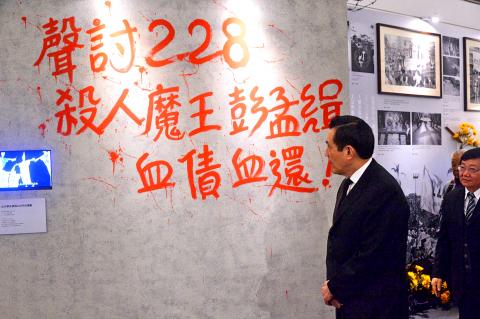Former president Ma Ying-jeou (馬英九) yesterday acknowledged Chiang Kai-shek’s (蔣介石) responsibility in the 228 Incident and the ensuing White Terror era, but said it requires deliberative rather than hasty judgement “to determine what that responsibility was.”
Ma made the remarks after completing a series of activities in Taipei to commemorate in advance the 70th anniversary of the 228 Incident, which began with him paying a tribute to a monument in the 228 Peace Memorial Park before visiting the Taipei 228 Memorial Museum and the National 228 Memorial Museum.
He was responding to reporters’ questions about the Ministry of Culture’s plans to draft a bill to reinvent the Chiang Kai-shek Memorial Hall in Taipei and pull merchandise from stores in the hall that feature Chiang’s likeness.

Photo: CNA
To have a correct understanding of Chiang, one must look at both his mistakes and accomplishments, Ma said, adding that Chiang is an important figure in modern Chinese history who had made considerable contributions to recovering, defending and building Taiwan.
“Nevertheless, as the head of state at the time, Chiang was undoubtedly liable for the 228 Incident and the White Terror era. As for exactly what kind of responsibility he had, I am afraid that is a matter for future generations to deliberate to reach a more accurate conclusion,” Ma said.
“Jumping to hasty conclusions would only create unnecessary conflicts,” he added.
The 228 Incident refers to a crackdown launched by the then-Chinese Nationalist Party (KMT) regime against civilian demonstrations following an incident in Taipei on Feb. 27, 1947.
The ensuing massacre and imposition of martial law marked the beginning of the decades-long White Terror era, during which thousands of Taiwanese were arrested, imprisoned and executed. Historians estimate as many as 30,000 people were killed.
Turning to the KMT’s past efforts to heal the wounds of the 228 Incident, Ma said it has done almost anything possible, including acknowledgment of mistakes, apologies, compensation, erection of commemorative monuments, designation of Feb. 28 as a national holiday and recovery of the truth.
“That being said, we should keep pursuing new threads and information if there are still any. This should be the attitude adopted by both the pan-blue and pan-green camps,” Ma said.
Dismissing some people’s belief that the 228 Incident was an ethnic conflict, the former president said that it was a confrontation between the government and its people triggered by the confiscation of contraband cigarettes.
“Evidence shows that in the aftermath of the incident, many Mainlanders were actually sheltered by Taiwanese,” Ma said.
As then-Taiwan governor-general Chen Yi (陳儀) was the one harshly criticized in China at the time, it suggests that “the 228 Incident was not an ethnic conflict back then and it should not be one now,” Ma said.

A Taiwanese software developer has created a generative artificial intelligence (AI) model to help people use AI without exposing sensitive data, project head Huang Chung-hsiao (黃崇校) said yesterday. Huang, a 55-year-old coder leading a US-based team, said that concerns over data privacy and security in popular generative AIs such as ChatGPT and DeepSeek motivated him to develop a personal AI assistant named “Mei.” One of the biggest security flaws with cloud-based algorithms is that users are required to hand over personal information to access the service, giving developers the opportunity to mine user data, he said. For this reason, many government agencies and

The National Fire Agency on Thursday said a series of drills simulating a magnitude 8.5 earthquake would be held in September to enhance the government’s emergency response capabilities. Since earthquakes cannot be predicted, only by continuously promoting disaster prevention measures could Taiwan enhance its resilience to earthquakes, agency Director-General Hsiao Huan-chang (蕭煥章) said in a news release. The exercises would be held to mark annual National Disaster Prevention Day on Sept. 21, the aim of which is to test Taiwan’s preparedness and improve its earthquake resilience in case of a major temblor, Hsiao said. As part of those drills, an earthquake alert would

DEFENSE: The National Security Bureau promised to expand communication and intelligence cooperation with global partners and enhance its strategic analytical skills China has not only increased military exercises and “gray zone” tactics against Taiwan this year, but also continues to recruit military personnel for espionage, the National Security Bureau (NSB) said yesterday in a report to the Legislative Yuan. The bureau submitted the report ahead of NSB Director-General Tsai Ming-yen’s (蔡明彥) appearance before the Foreign and National Defense Committee today. Last year, the Chinese People’s Liberation Army (PLA) conducted “Joint Sword-2024A and B” military exercises targeting Taiwan and carried out 40 combat readiness patrols, the bureau said. In addition, Chinese military aircraft entered Taiwan’s airspace 3,070 times last year, up about

STRICTER ENFORCEMENT: Taipei authorities warned against drunk cycling after a sharp rise in riding under the influence, urging greater public awareness of its illegality Taipei authorities have issued a public warning urging people not to ride bicycles after consuming alcohol, following a sharp rise in riding under the influence (DUI) cases involving bicycles. Five hundred and seven people were charged with DUI last year while riding YouBikes, personal bicycles, or other self-propelled two-wheelers — a fourfold increase from the previous year, data released by the Taipei Police Department’s Traffic Division showed. Of these, 33 cases were considered severe enough to be prosecuted under “offenses against public safety,” the data showed. Under the Road Traffic Management and Penalty Act (道路交通管理處罰條例), bicycles — including YouBikes and other